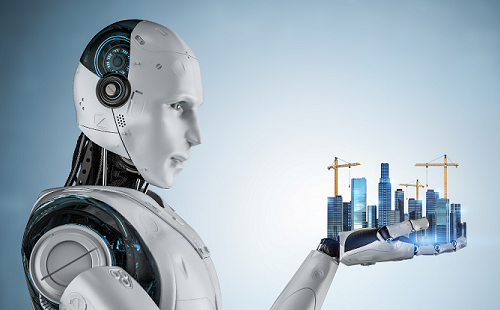AI in Construction Market Overview:
The construction industry is undergoing a significant transformation with the integration of Artificial Intelligence (AI) technologies. The AI in Construction Market is projected to grow substantially, driven by the need for enhanced efficiency, safety, and cost-effectiveness. The market is valued at several billion dollars and is expected to expand at a compound annual growth rate (CAGR) of over 32.66% through the next five years. This growth can be attributed to the increasing adoption of AI-driven solutions for project management, predictive analytics, and automation in construction processes. Key applications include design optimization, risk management, and resource allocation, which are becoming essential as projects grow in complexity.
Market Key Players:
Several key players dominate the AI in construction market landscape. Companies such as Autodesk, IBM, and Oracle are leading providers of AI-based software solutions that enhance project planning and execution. Additionally, startups like Buildots and Doxel are gaining traction by offering innovative AI tools that leverage computer vision and machine learning to monitor construction sites in real-time. Other notable players include Trimble Inc., which focuses on integrating AI with its existing suite of construction management tools, and Siemens AG, which applies AI for smart building solutions. These companies are investing heavily in research and development to stay competitive and meet the evolving needs of the construction sector.
Download Free Exclusive Sample PDF:
https://www.marketresearchfuture.com/sample_request/6035
Market Segmentation:
The AI in construction market can be segmented based on technology type, application, end-user industry, and region. By technology type, it includes machine learning algorithms, natural language processing (NLP), computer vision systems, and robotics. In terms of application, key segments encompass project management software, predictive maintenance tools, safety management systems, and design optimization platforms. The end-user industries primarily consist of residential construction, commercial buildings, infrastructure development, and industrial facilities. Regionally, North America holds a significant share due to the early adoption of advanced technologies; however, Asia-Pacific is anticipated to witness rapid growth owing to increasing urbanization and infrastructure investments.
Market Drivers:
Several factors drive the growth of AI in the construction market. One major driver is the increasing demand for automation within the industry to improve productivity levels while reducing labor costs. Construction projects often face delays due to inefficiencies; thus implementing AI can streamline operations significantly. Furthermore, safety concerns on job sites have prompted companies to adopt AI-powered safety monitoring systems that utilize real-time data analysis to predict potential hazards before they occur. Another driver is the growing emphasis on sustainability; AI technologies can optimize resource usage and minimize waste during construction processes.
Market Opportunities:
The integration of AI into construction presents numerous opportunities for innovation and improvement across various facets of the industry. For instance, there is a rising trend toward smart buildings equipped with IoT devices that collect data analyzed by AI algorithms for better energy management and operational efficiency. Additionally, advancements in drone technology combined with AI can facilitate site surveying and monitoring tasks more accurately than traditional methods allow. The potential for developing customized solutions tailored specifically for niche markets within construction also represents a lucrative opportunity for tech companies looking to enter this space.
Regional Analysis:
Geographically speaking, North America currently leads the AI in construction market due to its robust technological infrastructure and high investment levels from both private sectors and government initiatives aimed at modernizing infrastructure. Europe follows closely behind with significant contributions from countries like Germany and France that prioritize digital transformation within their economies. Meanwhile, Asia-Pacific is emerging as a hotbed for growth driven by rapid urbanization trends in countries such as China and India where large-scale infrastructure projects are underway requiring efficient management solutions powered by artificial intelligence.
Industry Updates:
Recent developments within the industry highlight an increasing focus on collaboration between traditional construction firms and tech startups specializing in artificial intelligence applications. Partnerships are being formed to develop integrated platforms that combine various aspects of project management into cohesive systems utilizing machine learning capabilities for predictive analytics purposes—this trend signifies a shift toward more data-driven decision-making processes within organizations aiming to remain competitive amidst evolving market demands.
Get Complete Report Details:
https://www.marketresearchfuture.com/reports/ai-in-construction-market-6035
Top Trending Reports: -

